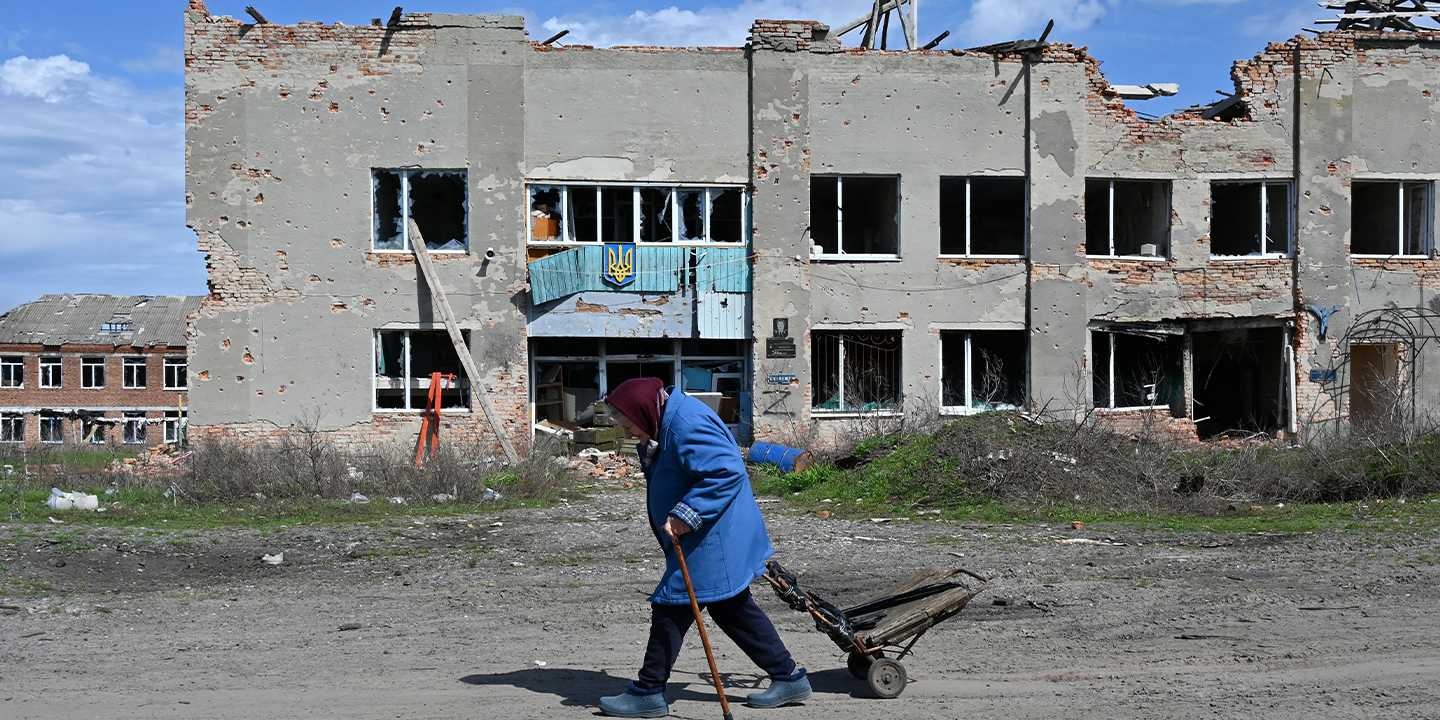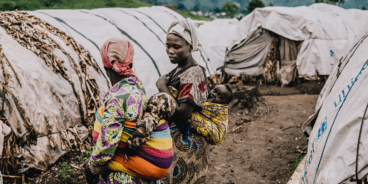

Atrocity Alert No. 349: Ukraine, Cameroon and Afghanistan
Atrocity Alert is a weekly publication by the Global Centre for the Responsibility to Protect highlighting situations where populations are at risk of, or are enduring, mass atrocity crimes.
OLDER PERSONS AT HEIGHTENED RISK AS INDISCRIMINATE ATTACKS CONTINUE IN UKRAINE
On 26 May a Russian missile strike hit a hospital complex in the central Ukrainian city of Dnipro, killing at least two people and injuring more than 30. The Ukrainian Parliament Commissioner for Human Rights, Dmytro Lubinets, said the recent strike on the hospital was further evidence that “Russia is at war with the civilian population.” Throughout the conflict, Russian forces have perpetrated myriad violations of International Humanitarian Law (IHL), including indiscriminate and disproportionate bombing and shelling of civilian areas and infrastructure, including medical facilities. The World Health Organization has verified 1,004 attacks on healthcare since February 2022, the highest number it has verified in any conflict.
IHL violations are having a devastating impact on civilians, particularly vulnerable populations, including older persons. According to a new report by the UN Human Rights Monitoring Mission in Ukraine (HRMMU), older persons – defined as people aged 60 and above – have suffered and died at a disproportionately high rate since the invasion. Although older persons represent 25 percent of Ukraine’s population, people over 60 made up 32 percent of civilians killed from 24 February 2022 to 28 February 2023.
Often unable or unwilling to flee their homes due to limited mobility, older persons comprise a disproportionate number of civilians remaining in conflict-affected areas across Ukraine, and as a result they are put at “extreme risk” of being killed or injured during shelling. The HRMMU documented several instances of older persons dying in hostilities because they were unable to reach a bomb shelter. For example, when Russian troops occupied Izium in March 2022, a disabled woman in her mid-sixties burned to death when her building was shelled and caught fire.
Older persons in conflict-affected areas have not only faced direct threats to their life, but are also suffering from food shortages, inadequate living conditions, electricity blackouts, water cuts and lack of access to health services, medication and pensions due to ongoing fighting and destroyed civilian infrastructure. The HRMMU documented on some occasions Russian soldiers forced civilians, including the elderly, to remain in basements for weeks in dire conditions. In one case 360 civilians were confined to an overcrowded school basement in Yahidne, Chernihiv region, without toilet facilities, clean water or ventilation for nearly a month, resulting in the deaths of 10 elderly persons. Russian checkpoints in Kherson also obstructed movements, resulting in several older people with diabetes dying for want of medication.
UN human rights monitors must be granted immediate and unfettered access to Russian-occupied areas of Ukraine. All parties should allow and facilitate unimpeded passage of humanitarian relief for civilians in need and ensure civilians can evacuate or access essential services. The specific needs of older persons must be accounted for and prioritized when organizing evacuations and securing long-term adequate accommodation for displaced people.
ABUSES AGAINST CIVILIANS CONTINUE IN ANGLOPHONE AREAS OF CAMEROON
On 20 May armed separatist groups kidnapped 30 women in the village Kedjom Keku in Cameroon’s north-west region, releasing them three days later. Local news sources have reported that some of the women were severely beaten and tortured or sustained gunshot wounds. The kidnapping took place a day after the women participated in peaceful protests against monthly taxes demanded by separatist groups. Separatists impose illegal taxes on civilians, including monthly taxes of 10,000 CFA francs (16 USD) for men and 5,000 CFA francs for women (8 USD), as well as taxes for unmarried couples or to bury deceased relatives.
Populations in Cameroon’s Anglophone north-west and south-west regions have faced widespread violence since tensions over cultural rights and the marginalization of Anglophone populations escalated in October 2016. In the resulting clashes, government forces and armed separatist groups have perpetrated grave violations and abuses that may amount to atrocities, including extrajudicial killings, kidnappings and torture. Since the crisis began, more than 6,000 civilians have been killed and at least 715,000 displaced.
The conflict dynamics in the north-west and south-west are shifting as the crisis becomes increasingly financially lucrative, with separatist groups having expanded their sources of revenue through kidnapping, looting and extortion to fund their operations. Since 2017 hundreds of people have been kidnapped in the north-west and south-west regions, including students, teachers, health workers, journalists and politicians. Following the kidnapping of the 30 women, in a statement the prefecture of the north-west region said that armed separatist groups are frequently kidnapping civilians in the area for ransom. As dissent grows among communities against the illegal taxes, some analysts and community members fear that the number of abductions could surge in the coming months.
Juliette Paauwe, Cameroon expert at the Global Centre for the Responsibility to Protect, said, “The international community often perceives the conflict in the Anglophone region as an insurgency by armed separatist groups against the Cameroonian government, but the situation has evolved into a multifaceted security crisis and humanitarian catastrophe, with vulnerable populations, including women and children, bearing the brunt of widespread violence. Despite the gravity of the crisis, the suffering of civilians continues to go unnoticed and unpunished.”
The international community should uphold its responsibility to protect by strongly condemning the ongoing violence against civilian populations in the north-west and south-west regions of Cameroon and urge the government to hold an inclusive dialogue with parties to the Anglophone crisis that is mediated by a neutral player on neutral territory. Armed separatist groups must halt all attacks on civilians and civilian infrastructure, including schools, hospitals and humanitarian convoys, and cease illegal taxation.
NEW REPORTING ON GENDER PERSECUTION IN AFGHANISTAN
A recent report from Amnesty International and the International Commission of Jurists determined that the Taliban de facto authorities’ severe restrictions on the rights of women and girls in Afghanistan may amount to the crime against humanity of gender persecution. The report provided detailed legal analysis of how the Taliban’s draconian restrictions on women and girls’ rights are enforced through a system of oppressive acts, including the systematic use of imprisonment, enforced disappearance, torture and other ill-treatment. Such acts may amount to the crime against humanity of gender persecution under Article 7(1)(h) of the Rome Statute of the International Criminal Court (ICC). Their findings reinforce previous assertions made by UN experts assessing the Taliban de facto authorities’ targeting of women and girls.
Since 15 August 2021 the Taliban de facto authorities have imposed a sweeping series of decrees that aim to erase women and girls from social, economic and political spheres, as well as public and daily life, implementing a system of institutionalized large-scale and systematic gender-based discrimination and violence against them. This includes restrictions on freedom of movement and expression, employment opportunities and access to education and healthcare. During November 2022 a group of UN Special Procedures emphasized that confining women and girls to their homes is “tantamount to imprisonment and is likely leading to increased levels of domestic violence.”
Women’s rights activists and human rights defenders have been subjected to killings, enforced disappearances, incommunicado detention, attacks, harassment, threats and arrests. Those peacefully protesting the growing restrictions on their rights have also been targeted, beaten and arrested.
Afghanistan has ratified a number of international treaties, including the Convention on the Elimination of All Forms of Discrimination Against Women (CEDAW). As the de facto authorities of Afghanistan, the Taliban bear primary responsibility to uphold Afghanistan’s legal obligations under international treaties, including those under CEDAW. In line with the recommendations from Amnesty International and the International Commission of Jurists’ report, prosecutors at the ICC should include the crime against humanity of gender persecution in their ongoing investigation into the situation in Afghanistan while states should exercise universal jurisdiction to hold the Taliban de facto authorities to account for crimes under international law.
Related Content


